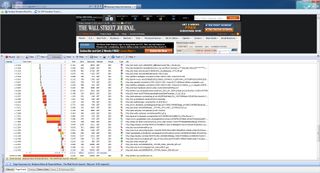Do Antivirus Suites Impact Your PC's Performance?
Most of us are now fairly confident that our antivirus scanners are doing their main job of protecting our systems from malicious pests. But what are those scanners doing to system performance behind the scenes? Are some scanners better than others?
How We Tested: Configuration
We tested on an open bench system comprised of the following components:
- Intel DX50SO2 motherboard (BIOS version 0876)
- Intel Core i7-2600K processor (Hyper-Threading enabled, 3.4 GHz)
- 8 GB (2 x 4 GB) OCZ Gold Edition 1333 MT/s DDR3, 9-9-9-20
- Sparkle Calibre X560 DF
- Western Digital Scorpio Blue 750 GB (primary drive)
- Patriot Wildfire 240 GB (secondary drive for image cloning)
- PC Power & Cooling Turbo-Cool 860
On this hardware platform, we installed Windows 7 Professional 64-bit and applied all critical update patches effective October 2, 2011. This also included:
- Nvidia GeForce driver version 280.26
- Intel / Realtek ALC audio driver 6449
- Intel / Renesas USB 3.0 driver 2.1.25.0
- Intel Pro Network Connections LAN driver 16.5
- Intel / Marvell eSATA driver 1.2.0.7700
- Intel RST driver 10.6.0.1002
- Intel chipset device software 9.2.0.1030
Rather than run a totally clean configuration, we additionally installed the following applications to better mimic a real-world system:
- Google Chrome 14.0.835.163
- Firefox 7.0.1
- OpenOffice 3.3.0
- Google Picasa 3.8
- Apple iTunes 10.4.1
- Apple QuickTime 7.7
- Adobe Flash Player
- Adobe Reader X 10.1.1
- 7-Zip 9.20 for 64-bit Windows x64
- CPU-Z 1.58
- Microsoft .NET 4
- Microsoft SDK 7.1
- PCMark 7
- HTTPWatch
With all of this software installed, we then disabled UAC, Windows Update service, the screen saver, Windows system restore, all task scheduler events, Action Center notifications, automatic Windows Error Reporting, taskbar notifications, all hibernate/standby power settings, and Windows Media Player services. Firefox, Chrome, and IE were all configured to disable the initial wizard and crash prompting while their home page was set to about:blank.

Finally, we copied 10.0 GB of photos, video, and document files into a sample data folder. This comprised our “clean” image. The image used only a single account with no password to ensure automatic login after rebooting, and no unknown devices were present in Device Manager. All automatic updating tools were disabled, and we rebooted Windows before using Symantec Ghost 15.0 to back up the image to a secondary drive. Only after this image was created and finalized did we run our first tests and subsequently install our AV contenders. After testing was completed on one AV product, we would reformat the Scorpio drive, then copy the clean image back to the newly formatted drive for loading of the next AV product.
Stay On the Cutting Edge: Get the Tom's Hardware Newsletter
Get Tom's Hardware's best news and in-depth reviews, straight to your inbox.
Current page: How We Tested: Configuration
Prev Page Contenders: Microsoft And Symantec Next Page How We Tested: Benchmarking-
dogman_1234 Regardless what anyone says: Using McAfee is like using a Glad garbage bag as a condom.Reply -
Martell77 I've been using Trend Micros AV since y2k and haven't had a reason to switch. Because of the systems my clients have I never recommend Norton or McAfee and if they have it I always recemmend they switch. Its truely amazing how the performance of their systems increases after getting rid of those AVs, especially Norton.Reply -
soccerdocks On the scanning time page there is an error in the second graph. It also says first run.Reply
Also, the timing of this article was excellent. I had just been doing some research about what anti-virus software I should switch to, mainly based on performance, but I guess I just got all the information I needed. -
compton Some of the results seem mysterious, like all the times the no-AV configuration scored lower in many tests than it should be faster in. Is it possible that using the Wildfire as the system drive instead of the platter would have eliminated this behavior? In general, I hope there is a second part to this that does include SSD runs. I would think any advantage AV products have vs. the no-AV config would evaporate.Reply
I stopped using AV products on my personal systems back in 2003. Norton back then was god-awful on a Pentium 4 systems, seemingly crushing the life out of a system. Even with a first generation WD Raptor 36GB my P4 2.6 would choke not only with Norton, but also McAfee. I might not use AV software, but I do put it on my family members' systems when it doesn't kill performance. In that respect these modern solutions seem much better.
-
ChiefTexas_82 On my Pentium D I have to run McAfee when I'm gone for a good while or sleeping as my computer slows to a crawl during the scan. Even bringing up the menus to stop the scan take way too long.Reply -
darkstar845 Why didn't they test this on a computer with average specs? The 8gb ram and very fast CPU might be offsetting the impact that the AVs put on the computer.Reply -
bit_user Thanks for this. I remember the bad old days when AV could make software builds take several times longer.Reply
-
cdhollan While my comment is completely tangential, but my inner chemical engineer can't resist making a small correction in what is otherwise a great article:Reply
>>Apparently, this is somewhat like saying you can boil water at 230 degrees Fahrenheit instead of 260 degrees. As long as the water is at 212 degrees or higher, no one really cares. -
rottingsheep installing vipre speeds up your computer?Reply
i think something is wrong with your numbers. -
Amazed ESET is not being tested considering it sells itself on its performance over the competition while maintaining the same levels of protection.....Reply
Most Popular

